#literary science fiction
Text
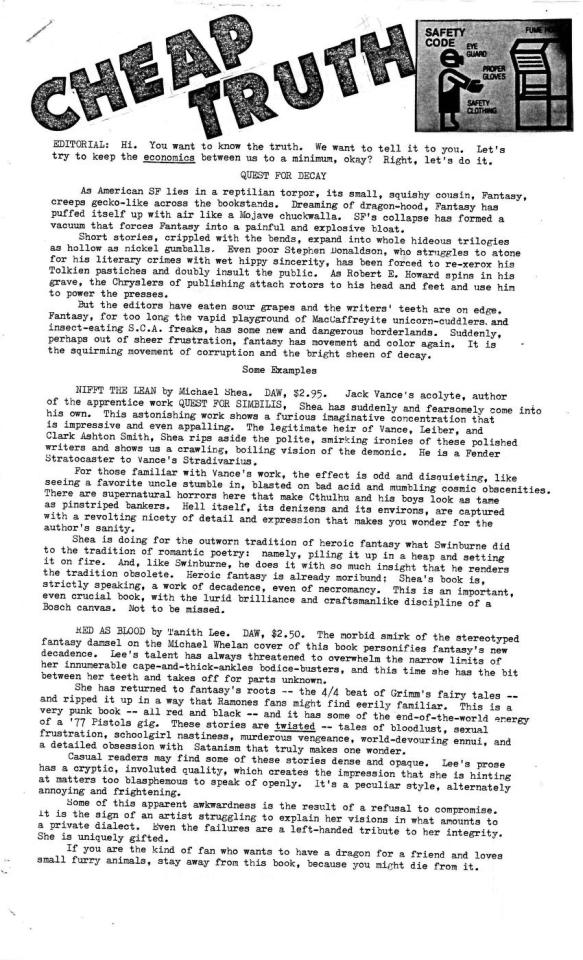
cheap truth / all isues - the house organ of the ocp (original cyberpunk) movement 1983-1986
''As American SF lies in a reptilian torpor, its small, squishy cousin, Fantasy, creeps gecko-like across the bookstands. Dreaming of dragon-hood, Fantasy has puffed itself up with air like a Mojave chuckwalla. SF's collapse has formed a vacuum that forces Fantasy into a painful and explosive bloat. Short stories, crippled with the bends, expand into whole hideous trilogies as hollow as nickel gumballs. Even poor Stephen Donaldson, who struggles to atone for his literary crimes with wet hippy sincerity, has been forced to re-xerox his Tolkien pastiches and doubly insult the public. As Robert E. Howard spins in his grave, the Chryslers of publishing attach rotors to his head and feet and use him to power the presses. But the editors have eaten sour grapes and the writers' teeth are on edge. Fantasy, for too long the vapid playground of MacUaffreyite unicorn-cuddlers. and insect-eating S.C.A. freaks, has some new and dangerous borderlands. Suddenly, perhaps out of sheer frustration, fantasy has movement and color again. It is the squirming movement of corruption and the bright sheen of decay.''
12 notes
·
View notes
Text
A cover illustration I did for Joseph Lallo, for his book Paradoxes and Dragons 2.


3K notes
·
View notes
Text
The true post-cyberpunk hero is a noir forensic accountant
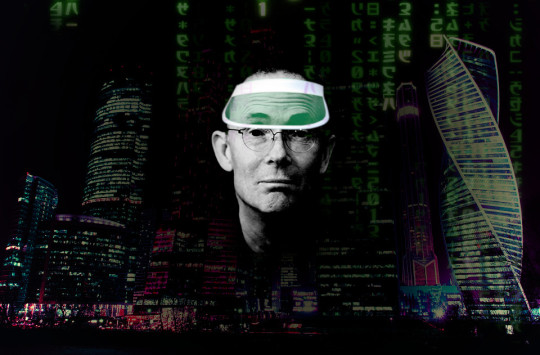
I'm touring my new, nationally bestselling novel The Bezzle! Catch me in TOMORROW (Apr 17) in CHICAGO, then Torino (Apr 21) Marin County (Apr 27), Winnipeg (May 2), Calgary (May 3), Vancouver (May 4), and beyond!

I was reared on cyberpunk fiction, I ended up spending 25 years at my EFF day-job working at the weird edge of tech and human rights, even as I wrote sf that tried to fuse my love of cyberpunk with my urgent, lifelong struggle over who computers do things for and who they do them to.
That makes me an official "post-cyberpunk" writer (TM). Don't take my word for it: I'm in the canon:
https://tachyonpublications.com/product/rewired-the-post-cyberpunk-anthology-2/
One of the editors of that "post-cyberpunk" anthology was John Kessel, who is, not coincidentally, the first writer to expose me to the power of literary criticism to change the way I felt about a novel, both as a writer and a reader:
https://locusmag.com/2012/05/cory-doctorow-a-prose-by-any-other-name/
It was Kessel's 2004 Foundation essay, "Creating the Innocent Killer: Ender's Game, Intention, and Morality," that helped me understand litcrit. Kessel expertly surfaces the subtext of Card's Ender's Game and connects it to Card's politics. In so doing, he completely reframed how I felt about a book I'd read several times and had considered a favorite:
https://johnjosephkessel.wixsite.com/kessel-website/creating-the-innocent-killer
This is a head-spinning experience for a reader, but it's even wilder to experience it as a writer. Thankfully, the majority of literary criticism about my work has been positive, but even then, discovering something that's clearly present in one of my novels, but which I didn't consciously include, is a (very pleasant!) mind-fuck.
A recent example: Blair Fix's review of my 2023 novel Red Team Blues which he calls "an anti-finance finance thriller":
https://economicsfromthetopdown.com/2023/05/13/red-team-blues-cory-doctorows-anti-finance-thriller/
Fix – a radical economist – perfectly captures the correspondence between my hero, the forensic accountant Martin Hench, and the heroes of noir detective novels. Namely, that a noir detective is a kind of unlicensed policeman, going to the places the cops can't go, asking the questions the cops can't ask, and thus solving the crimes the cops can't solve. What makes this noir is what happens next: the private dick realizes that these were places the cops didn't want to go, questions the cops didn't want to ask and crimes the cops didn't want to solve ("It's Chinatown, Jake").
Marty Hench – a forensic accountant who finds the money that has been disappeared through the cells in cleverly constructed spreadsheets – is an unlicensed tax inspector. He's finding the money the IRS can't find – only to be reminded, time and again, that this is money the IRS chooses not to find.
This is how the tax authorities work, after all. Anyone who followed the coverage of the big finance leaks knows that the most shocking revelation they contain is how stupid the ruses of the ultra-wealthy are. The IRS could prevent that tax-fraud, they just choose not to. Not for nothing, I call the Martin Hench books "Panama Papers fanfic."
I've read plenty of noir fiction and I'm a long-term finance-leaks obsessive, but until I read Fix's article, it never occurred to me that a forensic accountant was actually squarely within the noir tradition. Hench's perfect noir fit is either a happy accident or the result of a subconscious intuition that I didn't know I had until Fix put his finger on it.
The second Hench novel is The Bezzle. It's been out since February, and I'm still touring with it (Chicago tonight! Then Turin, Marin County, Winnipeg, Calgary, Vancouver, etc). It's paying off – the book's a national bestseller.
Writing in his newsletter, Henry Farrell connects Fix's observation to one of his own, about the nature of "hackers" and their role in cyberpunk (and post-cyberpunk) fiction:
https://www.programmablemutter.com/p/the-accountant-as-cyberpunk-hero
Farrell cites Bruce Schneier's 2023 book, A Hacker’s Mind: How the Powerful Bend Society’s Rules and How to Bend Them Back:
https://pluralistic.net/2023/02/06/trickster-makes-the-world/
Schneier, a security expert, broadens the category of "hacker" to include anyone who studies systems with an eye to finding and exploiting their defects. Under this definition, the more fearsome hackers are "working for a hedge fund, finding a loophole in financial regulations that lets her siphon extra profits out of the system." Hackers work in corporate offices, or as government lobbyists.
As Henry says, hacking isn't intrinsically countercultural ("Most of the hacking you might care about is done by boring seeming people in boring seeming clothes"). Hacking reinforces – rather than undermining power asymmetries ("The rich have far more resources to figure out how to gimmick the rules"). We are mostly not the hackers – we are the hacked.
For Henry, Marty Hench is a hacker (the rare hacker that works for the good guys), even though "he doesn’t wear mirrorshades or get wasted chatting to bartenders with Soviet military-surplus mechanical arms." He's a gun for hire, that most traditional of cyberpunk heroes, and while he doesn't stand against the system, he's not for it, either.
Henry's pinning down something I've been circling around for nearly 30 years: the idea that though "the street finds its own use for things," Wall Street and Madison Avenue are among the streets that might find those uses:
https://craphound.com/nonfic/street.html
Henry also connects Martin Hench to Marcus Yallow, the hero of my YA Little Brother series. I have tried to make this connection myself, opining that while Marcus is a character who is fighting to save an internet that he loves, Marty is living in the ashes of the internet he lost:
https://pluralistic.net/2023/05/07/dont-curb-your-enthusiasm/
But Henry's Marty-as-hacker notion surfaces a far more interesting connection between the two characters. Marcus is a vehicle for conveying the excitement and power of hacking to young readers, while Marty is a vessel for older readers who know the stark terror of being hacked, by the sadistic wolves who're coming for all of us:
https://www.youtube.com/watch?v=I44L1pzi4gk
Both Marcus and Marty are explainers, as am I. Some people say that exposition makes for bad narrative. Those people are wrong:
https://maryrobinettekowal.com/journal/my-favorite-bit/my-favorite-bit-cory-doctorow-talks-about-the-bezzle/
"Explaining" makes for great fiction. As Maria Farrell writes in her Crooked Timber review of The Bezzle, the secret sauce of some of the best novels is "information about how things work. Things like locks, rifles, security systems":
https://crookedtimber.org/2024/03/06/the-bezzle/
Where these things are integrated into the story's "reason and urgency," they become "specialist knowledge [that] cuts new paths to move through the world." Hacking, in other words.
This is a theme Paul Di Filippo picked up on in his review of The Bezzle for Locus:
https://locusmag.com/2024/04/paul-di-filippo-reviews-the-bezzle-by-cory-doctorow/
Heinlein was always known—and always came across in his writings—as The Man Who Knew How the World Worked. Doctorow delivers the same sense of putting yourself in the hands of a fellow who has peered behind Oz’s curtain. When he fills you in lucidly about some arcane bit of economics or computer tech or social media scam, you feel, first, that you understand it completely and, second, that you can trust Doctorow’s analysis and insights.
Knowledge is power, and so expository fiction that delivers news you can use is novel that makes you more powerful – powerful enough to resist the hackers who want to hack you.
Henry and I were both friends of Aaron Swartz, and the Little Brother books are closely connected to Aaron, who helped me with Homeland, the second volume, and wrote a great afterword for it (Schneier wrote an afterword for the first book). That book – and Aaron's afterword – has radicalized a gratifying number of principled technologists. I know, because I meet them when I tour, and because they send me emails. I like to think that these hackers are part of Aaron's legacy.
Henry argues that the Hench books are "purpose-designed to inspire a thousand Max Schrems – people who are probably past their teenage years, have some grounding in the relevant professions, and really want to see things change."
(Schrems is the Austrian privacy activist who, as a law student, set in motion the events that led to the passage of the EU's General Data Privacy Regulation:)
https://pluralistic.net/2020/05/15/out-here-everything-hurts/#noyb
Henry points out that William Gibson's Neuromancer doesn't mention the word "internet" – rather, Gibson coined the term cyberspace, which, as Henry says, is "more ‘capitalism’ than ‘computerized information'… If you really want to penetrate the system, you need to really grasp what money is and what it does."
Maria also wrote one of my all-time favorite reviews of Red Team Blues, also for Crooked Timber:
https://crookedtimber.org/2023/05/11/when-crypto-meant-cryptography/
In it, she compares Hench to Dickens' Bleak House, but for the modern tech world:
You put the book down feeling it’s not just a fascinating, enjoyable novel, but a document of how Silicon Valley’s very own 1% live and a teeming, energy-emitting snapshot of a critical moment on Earth.
All my life, I've written to find out what's going on in my own head. It's a remarkably effective technique. But it's only recently that I've come to appreciate that reading what other people write about my writing can reveal things that I can't see.

If you'd like an essay-formatted version of this post to read or share, here's a link to it on pluralistic.net, my surveillance-free, ad-free, tracker-free blog:
https://pluralistic.net/2024/04/17/panama-papers-fanfic/#the-1337est-h4x0rs

Image:
Frédéric Poirot (modified)
https://www.flickr.com/photos/fredarmitage/1057613629 CC BY-SA 2.0
https://creativecommons.org/licenses/by-sa/2.0/
#pluralistic#science fiction#cyberpunk#literary criticism#maria farrell#henry farrell#noir#martin hench#marty hench#red team blues#the bezzle#forensic accountants#hackers#bruce schneier#post-cyberpunk#blair fix
198 notes
·
View notes
Text
Not sure what my motive is here, but . . .
The results will not affect which books I post about, because I actually have to want to read them, but I'm dying to know who likes to suffer!
#please i really wanna see the discourse!#book recommendations#queer books#polls#queer#literary tropes#literary fiction#fantasy books#romance books#science fiction books#historical fiction#books#queer community
212 notes
·
View notes
Text
Science Fiction as a Reflection on Society - PLUTO & The Cycle of Hate
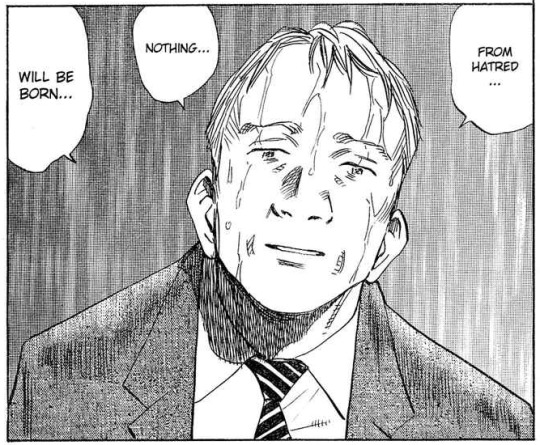
MAJOR SPOILER WARNING -You can read this before reading PLUTO but it will spoil many major plot points!
In 2015, I picked up a manga volume in a London bookshop called PLUTO. I had a burgeoning interest in AI, and computer science, at the time and had read Naoki Urasawa's manga Monster many years prior. It seemed a perfect read. Little did I know, it would become my favourite manga.
As I read the first volume I realised this wasn't just a simple Astro Boy adaptation. Like many of Urasawa's stories, PLUTO was a layered story which took its source material and asked fundamental questions about its premise.
The more innocent veneer of the Astro Boy world was stripped away, and echoes of the Middle East, of Afganistan, Iraq and Palestine, were transposed into the background of what was on the surface a simple detective story plot. The long memories, and relentless logic, of robots became a means by which conflict could be examined, but also a way to reveal the weaknesses in the non-empathetic nature of robotics and AI.
Instead of a traditional manga and anime trope of beating the strongest villain against the odds, it became a tragic, yet hopeful, story about the long-tail effects of trauma and how our memories of the past, remembered or misremembered, shape our present.
Those who cannot remember the past are condemned to repeat it
From the 1980s Soviet invasion to the modern day US involvement in the Middle East, the trauma of the conflict had lasting impacts on both the invaded countries, and those who invaded. Talented people, who at peace could have done and produced great things, were reduced to administering corrupt governments, fighting occupying forces and wasting their lives on a fractious peace based on subterfuge and realpolitik.
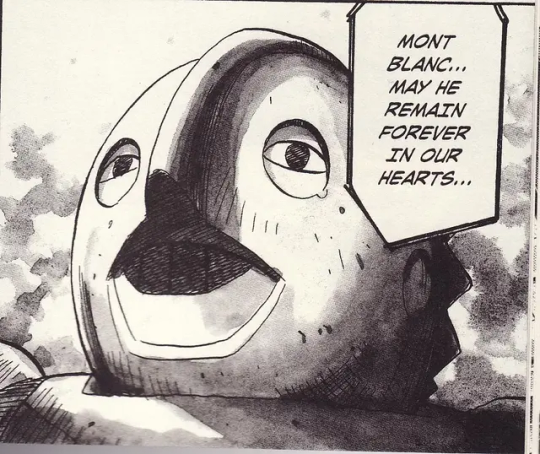
Robot Mont. Blanc, killed in the opening part of PLUTO acts as the introduction of this theme. A deeply environmentalist robot, who was beloved by mountaineers and children alike, was sent to fight in a war whose values conflicted with his own.
Despite his experiences, he went on to live in his old life - tending to and caring for the Swiss Alps and those who lived within them, but was ultimately killed by a mysterious perpetrator.
This theme is carried through with all the "greatest robots on Earth", who are targeted by PLUTO, and who all are trying to make something of their lives after the end of the conflict, most of whom have managed to shake off the negative experiences of their past - while still being haunted by it.
During the gradual decolonization of the colonial powers of Europe in the Middle East, there existed periods in the Middle East of relative calm and stability. People were able to life affluent, and prosperous lives without the threat of violence and revolution - with collaboration between US, European and USSR workers and those who lived there allowing for the construction of infrastructure and advanced manufacturing facilities.
But what about those who can't deal with their past. What about those who are deeply damaged?
PLUTO - The Greatest Trauma on Earth
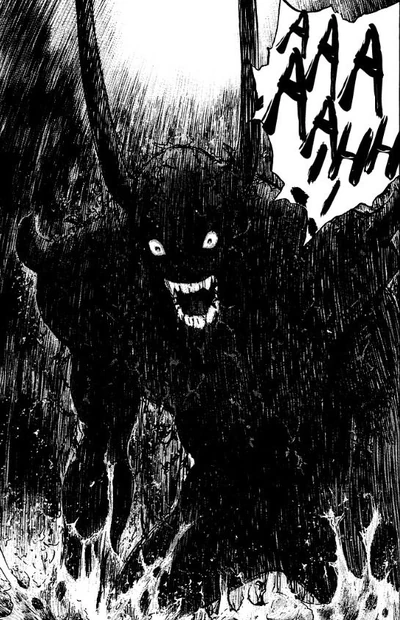
MAJOR PLOT SPOILER WARNING
So what is PLUTO? Who is PLUTO? He is nothing more than a robot who loves flowers, created by the Persian scientist Dr Abullah. His love for the plant makes him want to plant flowers across the country, to fill it with beauty and richness. He is someone with hopes, and dreams, to make a beautiful world which can be enjoyed by the people who live there.
At least, that's what he used to be.
As the 39th Central Asian Conflict drags on, Dr Abdullah become bitter and resentful at what has happened to his country. A once proud nation reduced to rubble and ruin. Instead of encouraging his robotic son to plant flowers, he fills his son with a vast hatred against those who have committed violence against his people.
The son who wanted nothing more than to make the world a better place is indoctrinated by his father into a being of pure rage, while fully knowing his previous self. The two sides of his personality ripping and tearing at each other in a self-contradictory nightmare.
Just as PLUTO is turned into a loathing monstrosity by his family, upbringing and situation - so too are those who live, fight and die in conflicts. Both the 2023 murder of innocent Israelis by Hamas, and the subsequent murders of innocent Palestinians by Israel have no doubt radicalised a new generation of martyrs, while their leaders - those meant to be inspiring and running the country in their name - directly encourage mass murder on both sides.
In Afghanistan, the hopes of a democratic society were undermined by a corrupt Western imposed system which broke down into Taliban rule in 2022. Collaborators killed or tortured. Women, once again, forced into roles they had broken out of.
But this cuts both ways.
In Afghanistan, both the Soviet invasion of the 1980s and the US/Coalition invasions of the 2000s led to a surge in Western soliders who came home from war angry, disillusioned and in mental and physical pain. Sometime from IED amputations, sometimes from PTSD and severe mental health issues.
Some survived the war, only to transfer their trauma to others at home or to end their own lives at their own hands. A generation of young military lives lost.
The Politics of Hate
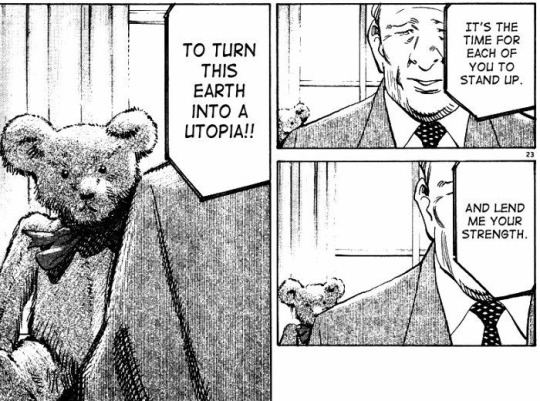
Newton's third law states: Each action has an equal, but opposite, reaction. This often occurs socially.
This is ever present in PLUTO with the Anti-robot league. That robots have any rights at all is anathema to these people, who organise a conspiracy to destroy the social fabric of robots in society through targeted assassinations and hatred.
Through their actions, they aim to convert others to their cause and roll back decades of progress in the world of PLUTO.
This occurs in reality just as readily.
The 9/11, 2001 Twin Towers bombings brought together the American people in sorrow, but they also led to the enabling of war.
It didn't matter that Saudi Arabia had allowed Osama Bin Laden to live, and plan, in their country prior to the attacks. It was Afghanistan and Iraq that were targeted on the most spurious of grounds. This was enabled, in part, by swathes of the public who wanted a form of revenge but was mainly supported by neo-cons in government.
The two sides of the coin in Gaza are Hamas, with their backers, and the hard right Israeli government.
Hope
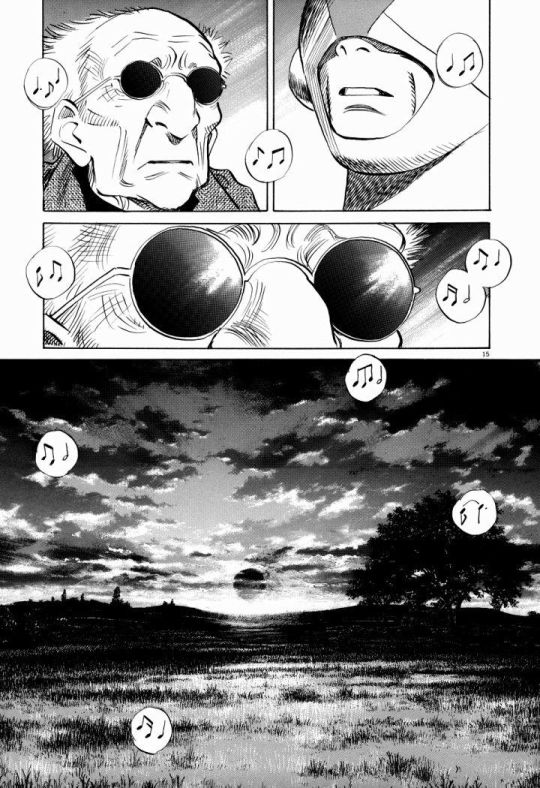
Despite the past, hope and recovery are still possible. This is what the story of North #2 and retired composer Paul Duncan reveals to us. An early inclusion in the manga, it also reveals some of the lighter themes of the work.
Paul Duncan's memories of his childhood, and his perceived Mother's abandonment of him to boarding school and almost terminal illness have coloured his entire life. When we meet him, he is a bitter old man who has a writer's block, and has taken on the ex-military robot North #2 as his butler.
But as the story reveals, Duncan's memories are coloured by his misconceptions of events. As North #2 learns to play the piano, against Duncan's wishes, he reveals the notes of the song that Duncan has been humming from his sleep - a song Duncan's mother used to sing to him as a child. It turns out that Ducan's mother didn't abandon him for a rich husband, but used that husband's wealth to pay for his expensive life-saving treatment and schooling.
It is only by dealing with the past, working through his trauma, that Duncan is able to heal in the present and move on with his life.
Conflict in Northern Ireland existed until the recent past of the late 1990s. This was against a backdrop of centuries of conflict between British settlers and the Irish natives. The Republic of Ireland was created in 1916 - but several Northern Counties remained in British control.
The period between 1916 and the Good Friday Agreement were filled with terrorist action by the IRA against the British Army and the repression of Catholic Irish people in the form of police/army brutality, gerrymandering, discriminatory hiring practices and in other forms.
This was only resolved through dialogue at the highest level between the British Government and Sinn Fein - the political wing of the IRA. It resulted in a peace process which has lasted decades, and has resulted in a generation who can now live, love and work with each other. This required hard decisions, to put past differences and strong emotional ties behind both sides. The results are extraordinary - and offer hope for any conflict.
Conclusions
The best stories I have read take the author's present experience, and insight, and use fiction as a vehicle to explore their themes and ideas. PLUTO takes the historical context of modern world events, and wraps it in an Astro Boy story which tells a story of how trauma, and hate, perpetuate themselves in cycles which come back to haunt and destroy others.
We can learn a lot from such stories. We should learn from them.
It is easy to continue to hate others, and react against clear provocations. It takes courage, bravery and sacrifice to break the cycle and begin anew - to create a new world. A world that Atom represents. A world with a brighter future.

#pluto#pluto manga#pluto anime#pluto spoilers#pluto netflix#naoki urasawa#science fiction#scifi#sci fi#politics#literary Analysis#long reads#long read
197 notes
·
View notes
Text
He should be the Iron King, and I should be the Iron Queen. Yet Iron Demon and Iron Widow is all they'll let us be.
— Xiran Jay Zhao, Iron Widow
#Iron Widow#books#quotes#literature#book quotes#literary quotes#science fantasy#science fiction#Xiran Jay Zhao
289 notes
·
View notes
Text
I am once again calling for book rants. It was so much fun the last time, and I crave more.
Do you have a long standing grudge against a book you read in middle school? Have you gotten swept up by hype only to find that everyone lied to you and the book is trash? Do you burn with rage over the way an author portrayed your favorite mythology or folklore? Is there a book or series that you once loved, but now makes you cringe every time you think about it?
Do you want to vent all of it out to someone who won't judge you, or argue with you, but will simply accept all your feelings as their own?
Hi, that person is me. Send me an ask, anonymous or not, and tell me everything you've wanted to say. Offer me your anger, your frustration, your hatred. I will hold it for you. I will take it into my heart and make it my own.
It can be any genre you want, any demographic. I will accept it all. Even if James Patterson gets involved again. (I'm not scared of you, James!!)
#literature#books#ya fiction#ya fantasy#ya dystopia#fiction#Reading#middle grade books#adult fantasy#science fiction#fantasy#literary fiction
181 notes
·
View notes
Text
There's something vastly amusing to me about the experience of bouncing between old sci-fi books where so many of the protagonists are Very Special Boys who speak 348 languages, master every skill they touch, and who can never be seen in situations that might be undignified or embarrassing (at least not without redeeming themselves two seconds later by winning an impossible fight or fulfilling an alien prophecy or whatever)...versus reading more recent sci-fi, where many of the protagonists are Just Some Dude/Just Some AI (who does have skills, but only in very particular areas) who stumbles backwards through their plotline by luck & possibly the power of anxiety and/or friendship.
#literary trends are fun#sci fi#science fiction#i'm not saying one is better than the other just to be clear#just that the differences are pretty stark#and very fun to think about#the murderbot diaries#project hail mary#dune#anything by robert heinlein
491 notes
·
View notes
Text
Review: Unbreakable by Mira Grant
Author: Mira Grant (Seanan McGuire)Publisher: Subterranean PressReleased: March 31, 2023Received: Own
Book Summary:
Unbreakable Starlight was one of many groups of girl warriors tasked with defending the planet. Unfortunately, their name was not quite accurate, as most of the group fell – alongside every other warrior.
Only two survived the massacre. Piper and Yuina. Now the government has…
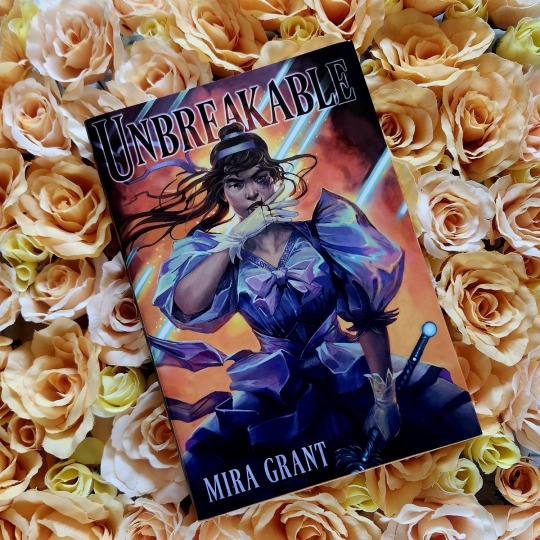
View On WordPress
#Book#Book Review#Books#Fiction#Horror#Literary#Literature#Mira Grant#Review#Science Fiction#Seanan McGuire#Subterranean Press#Superhero#teen superhero#Unbreakable#Unbreakable by Mira Grant
154 notes
·
View notes
Text
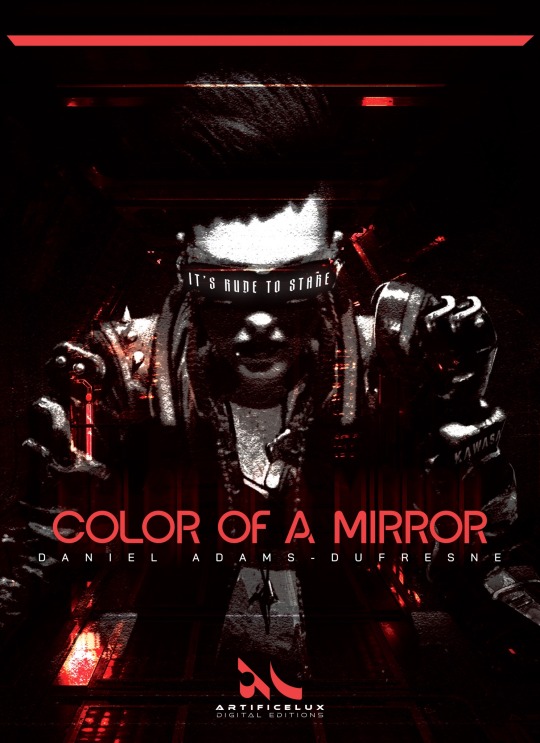
Unconventional literary science fiction? ☑️
Dark cyberpunk setting that oozes from each page? ☑️
Badass female main character? ☑️
Available in e-book so you don’t have to deal with international shipping? ☑️☑️☑️
Buy COLOR OF A MIRROR direct from the author (AKA: me). No bullshit. No subscriptions. No gatekeeping.
Welcome to the Dive.
•
colorofamirror.net
#cyberpunk#cyberpunknovel#debut author#debut novel#dark science fiction#writing#badass female characters#darkfuturism#literary fiction#graphic design#abstract art#minimalism#noir#brutalism#geometric#futuristic#typography#darkambientsoundtrack#bladerunner#neuromancer
52 notes
·
View notes
Text

“Literary” speculative fiction reading list
A list of recommended sci-fi and fantasy books with high-quality prose and serious or complex themes, including works by Le Guin, Wolfe, Delany, Miéville, and Banks. This selection is drawn from a much longer list of well-written and ambitious SF that I published on my website.
#book recs#book recommendations#book reccs#reading list#book list#speculative fiction#science fiction#fantasy#sci fi and fantasy#le guin#china mieville#iain banks#gene wolfe#samuel r. delany#literary#literature
173 notes
·
View notes
Text
The Mirrorshades Collective

academic article about the original cbrpnk cadres. good stuff.
''About the closest thing here to a self-willed esthetic ‘school’ would be the purveyors of bizarre hard-edged, high-tech stuff, who have on occasion been referred to as ‘cyberpunks’—
Sterling, Gibson, Shiner, [Pat] Cadigan, [Greg] Bear […] the similarities in goals and esthetics between them are much stronger and more noticeable than the (admittedly real) differences. For one thing, they are all ambitious writers, not satisfied to keep turning out the Same Old Stuff. Once again it is a time for literary risk-taking, and once again those who take them are admirable—and that makes it an exciting time for sf as a genre.'' 1984
RoutledgeHandbooks-9781351139885-chapter3.pdf
13 notes
·
View notes
Text
Review of 'The Time Machine' by H.G. Wells
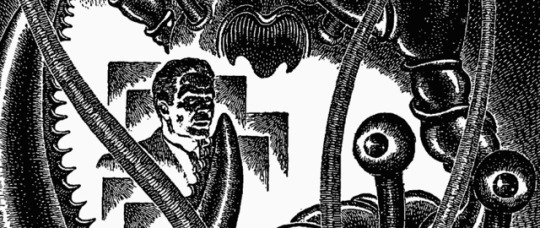
The stories of H.G.Wells are rich and captivating worlds where he makes the unfathomable seem plausible. Wells uses concepts from the sciences readily in his writing as a base of reality. His protagonists tend to be inquisitive types that posit questions about the state of the world, often giving and testing their hypotheses along a surreal adventure. In The Time Machine our protagonist is simply and ambiguously labeled the Time Traveler. He has just transformed physics forever by creating a vehicle that can fold and traverse spacetime. Now he aims to demonstrate to his civilized friends his unbelievable achievement. In a way this demonstration is both a primer for them and a reassurance for himself that he is not in a fantasy.
“Can an instantaneous cube exist?”
This is a question the Time Traveler asks his dinner party audience in order to introduce the concept of Time as the 4th dimension. He claims you need “duration” for anything to truly exist. If a cube only exists for an imperceptible instant then did it really exist? It’s a question that provokes a bunch of thoughts. How long is an instant? If an instant is measurable then the cube did exist for a time, no? But without the evidence of creation or decay of the cube how can we be certain that it existed? This question is a seemingly untestable hypothetical.
“But you are wrong to say that we cannot move about in Time. For instance, if I am recalling an incident very vividly I go back to the instant of its occurrence: I become absent-minded, as you say. I jump back for a moment. Of course we have no means of staying back for any length of Time, any more than a savage or an animal has of staying six feet above the ground. But a civilized man is better off than the savage in this respect. He can go up against gravitation in a balloon, and why should he not hope that ultimately he may be able to stop or accelerate his drift along the Time-Dimension, or even turn about and travel the other way?"
The idea of memories being a way to time travel brings into thought a swell of philosophy. Is time really just a figment of consciousness. A way for humans to make sense of the world, to traverse it, to learn from it. Many scientists seem to think so (1). A mind altering realization that I can’t truly grasp fully. But what if in a way thinking of time as just a construct of the mind might reveal an ultimate interpretation of this extraordinary tale that’s being told. I’m sure it’s read that way by some.
Also, ‘if ever a creature could figure out time travel it’s humans’, believes the Time Traveler. His distinction between “civilized” man and a “savage” is problematic to say the least, but we’ll revisit that later because it has major bearing on how our protagonist sees the world.
Distinguishing the 4th dimension of Time as another measure of existence (like the 3 Euclidian measures of height, length and width) is a way for the reader, and the dinner party audience, to conceptualize it as a plane that we can move along. Today scientists still haven’t cracked the code of time travel and some contest Time being the 4th dimension at all. (2)(3)
“The peculiar risk lay in the possibility of my finding some substance in the space which I, or the machine, occupied. So long as I travelled at a high velocity through time, this scarcely mattered: I was, so to speak, attenuated— was slipping like a vapour through the interstices of intervening substances! But to come to a stop involved the jamming of myself, molecule by molecule, into whatever lay in my way: meant bringing my atoms into such intimate contact with those of the obstacle that a profound chemical reaction-possibly a far-reaching explosion-would result, and blow myself and my apparatus out of all possible dimensions into the Unknown. This possibility had occurred to me again and again while I was making the machine”
Here the Time Traveler is describing his first, future time warp. Imagine flying through time and seeing your home, and world as you knew it, vanish. It reads as an incredibly disorienting experience. And this possibility of stopping at the wrong time and fusing with some obstruction in his position seems like a massive red flag. The logic that Wells presents shows how deep he went in imagining what time travel would be like. He intuitively analyzed many of the potential pitfalls that could occur.
“What might appear when that hazy curtain was altogether withdrawn? What might not have happened to men? What if cruelty had grown into a common passion? What if in this interval the race had lost its manliness and had developed into something inhuman, unsympathetic, and overwhelmingly powerful? I might seem some old-world savage animal, only the more dreadful and disgusting for our common likeness, a foul creature to be incontinently slain.”
And here begins the traveler’s speculative musings on the futurity of man. I enjoy this aspect of the story in particular because of my own fascination with humanity’s future. Here he contemplates what we might turn into. Projecting forward, knowing that our species has a long history of warring against each other, it would be a safe bet that that would continue. It has for some time. But is it intrinsic to what our species is? One read of this quote is that the Traveler thinks cruelty is currently uncommon, and that we might devolve into being cruel creatures. Wells and the Time Traveler are from England. They grew up as citizens of a colonial power, used to a culture of cruel conquest. They are also used to thinking that to maintain their civilization some other peoples need to be on the sacrificial end. This dichotomic mentality deems all other lives expendable on their route to control, and maybe this line of thinking from the Time Traveler is an example of that mentality bleeding over into his predictions. When I read that last sentence of the quote I couldn’t help but think about the British colonist’s warped rationale for incontinently slaying the indigenous peoples of Australia or N. America. A bit of projection maybe?
Now he’ll actually stop at a time, far different than his own. A moment in time where mother nature’s diversity has been restored, while humanity is “upon the wane.”
“You see I had always anticipated that the people of the year Eight Hundred and Two Thousand odd would be incredibly in front of us in knowledge, art, everything. Then one of them suddenly asked me a question that showed him to be on the intellectual level of one of our five-year-old children- asked me, in fact, if I had come from the sun in a thunderstorm! … A flow of disappointment rushed across my mind. For a moment I felt that I had built the Time Machine in vain.”
The anticipation of a progressive revolution speaks to his belief in humanity’s continued evolution (whatever that means). It can be coming from a societally egoistic perspective or a self-ego perspective, being that the Time Traveler can see himself as a revolutionary inventor. Thinking that we will always be progressing doesn’t take into account the pitfalls that come from our expansion.
I think that Wells actually does a nice job in creating this character that doesn’t get lost in himself too much, and tends to stick to ideas about the world. He rolls with the punches of having some of his hypotheses turn out wrong. He is human of course and does have brief episodes of existential dread, but the plot is more important than character to this story. In a way it is more captivating that way. The protagonist can be an amorphous entity for the reader to plop themselves into to experience the imaginary world of time travel.
Meeting the Eloi people in this moment shatters the glass of that societal ego. Our traveler was so looking forward to ascertaining the future’s wisdom. My interpretation is that The Time Machine is unwittingly prophetic in distinct ways. And that the future’s wisdom is revealed. More to come.
“For the first time I began to realise an odd consequence of the social effort in which we are at present engaged. And yet, come to think, it is a logical consequence enough. Strength is the outcome of need; security sets a premium on feebleness. The work of ameliorating the conditions of life-the true civilising process that makes life more and more secure-had gone steadily on to a climax. One triumph of a united humanity over Nature had followed another. Things that are now mere dreams had become projects deliberately put in hand and carried forward. And the harvest was what I saw!”
“Social triumphs, too, had been effected. I saw mankind housed in splendid shelters, gloriously clothed, and as yet I had found them engaged in no toil. There were no signs of struggle, neither social nor economical struggle. The shop, the advertisement, traffic, all that commerce which constitutes the body of our world, was gone. It was natural on that golden evening that I should jump at the idea of a social paradise.”
He finds a world where the small population of Eloi are thought to be our last descendants. There is very little modern architecture left, and even less not fully claimed back by vegetation. Wondering why there are so few people left and why no one is doing any work, he speculates that it might be the logical order of a fully realized civilized world. A utopia of sorts where life is so easy that we have adjusted to a life of physical and mental sloth. The idea of the exponentially increasing civilizing process is a prevalent idea in present day thought. First it assumes that civility = collective good, when practically speaking only a subset of our population benefits from this modernity while the other part either toils to maintain it or gets excluded from it. Which brings up another variable when projecting forward, which is; what happens to class and human exploitation. The trend of modernity, industrialization, civilization or whatever you want to call it hasn’t necessarily been in effort to make life easier in those respects. Some technologies and medicines have of course had positive effects, but toil and hardship has stayed steadfast (4). You can even argue that there were many ‘primitive’ societies that lived more sustainably and with less toil than us (5). What I’m ultimately saying is that “ameliorating the conditions of life” can be helped of course by developments in our understanding about the world (such as in medical science and tech), but that one of those developments has to be an egalitarian and democratic society. At least if we want to shoot for utopia.
Anyway, this timeline of history doesn’t entirely hold up as the Time Traveler searches for more clues.
“Very simple was my explanation, and plausible enough—as most wrong theories are!"
We cannot fully affirm the Time Traveler’s conjecture anymore because he has proven himself fallible. Yet he does make some convincing arguments for certain aspects of the changed world. These must be considered. I like that he’s not an all knowing narrator. He is trying his best to have educated hypotheses about this confusing new age.
“Even in our own time certain tendencies and desires, once necessary to survival, are a constant source of failure. Physical courage and the love of battle, for instance, are no great help—may even be hindrances—to a civilised man.”
Here I agree with him that our proclivity for battle is a negative. I feel linking “physical courage and the love of battle” either doesn’t translate well to today (and I’m not understanding) or they are distinctly separate tendencies. You can be courageous and put your body on the line for the greater good of humanity; hence it wouldn’t be a hinderance. That can be through battle or it can be through other means like protest. And once again the Time Traveler makes a distinction here between civilized man and humanity in general. His use of vocabulary like “savage” and “civilized” throughout the novella depict a man who sees himself as a distinct version of humanity or an entirely different being in general. One that’s superior to other peoples. This thinking is in line with 19th century European views and informs their creation of the defunct classification of race (6).
“The Time Machine was gone! At once, like a lash across the face, came the possibility of losing my own age, of being left helpless in this strange new world.”
After a day getting acquainted with his surroundings he gets this heart stopper. Coming to the conclusion that his invention must have been moved deliberately, he begins his search for the culprit. It couldn’t have been the “indolent” Eloi. He befriends one of them that he names Weena and she joins the traveler on his explorations.
“But, gradually, the truth dawned on me: that Man had not remained one species, but had differentiated into two distinct animals: that my graceful children of the Upper World were not the sole descendants of our generation, but that this bleached, ob-scene, nocturnal Thing, which had flashed before me, was also heir to all the ages.”
His first encounter with the Morlocks, the Eloi’s underground counterparts.
“At first, proceeding from the problems of our own age, it seemed clear as daylight to me that the gradual widening of the present merely temporary and social difference between the Capitalist and the Labourer, was the key to the whole position.”
I had to stop and think about this one. Could it be possible for a class divide of peoples that stretches on for millennia to actually produce distinct creatures? I think 800,000 years is long enough for a species to evolve some changed features, especially moving down into a subterranean environment. Still, the people that lived there would have to have been forced to live there by the upper worlders. In a Capitalist vs laborer dynamic we know from history that uprisings would likely occur amongst the subjugated class which would make it difficult for the dynamic to stay so divided. Especially if the Eloi ancestors were dependent on the labor that the Morlock ancestors were producing, as the traveler hypothesizes. As long as humans have been organizing together there have been some who selfishly try to extract a bigger piece of the pie at the expense of others; at the expense of equality. I think Wells recognizes an existing class divide and extrapolates out from there to create a semi-logical science fiction future. From a capitalist’s perspective having a labor force trapped underground, unable to complain or taint the image of your exclusive eden, seems ideal. This imagery is extremely reminiscent of another classic short story called The Ones Who Walk Away from Omelas by Ursula K. Le Guin (7). Wells’ conceives of many possible variables that might’ve shaped his world, but leaves room for a reader to interpret. I want to take some of his prophetic descriptions and offer up my own reading after the following quote.
“I think I have said how much hotter than our own was the weather of this Golden Age. I cannot account for it. It may be that the sun was hotter, or the earth nearer the sun.”
Well Wells, maybe it was hotter because of human induced climate change. There are plenty of anecdotes in the story that describe humanity as the main arbiter of earth’s future changes. We all tend to acknowledge that as a matter of fact. The agricultural and industrial revolutions proved that we, more than any other species, shape the landscape of the world. But having the hindsight of 21st century knowledge really informs how I see The Time Machine. In the story humanity has decreased in numbers drastically, has devolved in its intellectual capacity, and our infrastructures have collapsed. Humans no longer are “progressing” in the modern sense where progress gets unnecessarily linked with expansion, extraction, and exploitation. Perhaps they are just living sustainably like any other creature. I know a small mention about the climate being hotter doesn’t explicitly point to climate change being the culprit for the Eloi’s reality. Still, could it be that the big existential crisis of our time was never remedied and this led to mass degradation of human society? Some of our smartest minds tend to think this is what’s coming for us (8). Maybe the forces of change ran half of humanity underground and that’s what birthed the Morlocks. Maybe traversing time in The Time Machine was in effort to glimpse into our unassured future.
“However great their intellectual degradation, the Eloi had kept too much of the human form not to claim my sympathy, and to make me perforce a sharer in their degradation and their Fear.”
A great example of the simplistic inclination we have to sympathize with who/what-ever looks most like us. It’s not to say it’s not practical because instinctually we gravitate towards our families who of course resemble us the most. But to overlook the science in favor of habit and familiarity has put humanity at odds with itself and the ecosystem. No matter the race, nationality, or however we choose to divide, the science says that we are all practically the same, with the same basic needs and desires. The same is true of us and the rest of the biosphere full of carbon based life forms. Disassociating ourselves from that collective has given us the illusion of invincibility. The repercussions will be severe.
“I felt the intensest wretchedness for the horrible death of little Weena. It seemed an overwhelming calamity. Now, in this old familiar room, it is more like the sorrow of a dream than an actual loss.”
Finally after many dramatic happenings (that I can keep listing but I genuinely recommend you read) the Time Traveler has found his machine and is able to return to a more familiar time. Recounting his experience is almost like thinking on a dream. His friends will hardly believe the tale and maybe some part of himself doesn’t either. Remember, if time is truly a construction of a conscious mind then maybe the time machine was merely a device that allowed the traveler to explore their own minds imagination of a prospective future. An experience akin to a deep psychedelic trip or lucid dreaming. In that case he might have thought that progress was inevitable but subconsciously knew that civilization “must inevitably fall back upon and destroy its makers in the end.” Surely some will think he’s just mad. I choose to believe the traveler’s account and take the revelation as what’s possibly to come on our current path.
“No. I cannot expect you to believe it. Take it as a lie—or a prophecy. Say I dreamed it in the workshop. Consider I have been speculating upon the destinies of our race until I have hatched this fiction. Treat my assertion of its truth as a mere stroke of art to enhance its interest. And taking it as a story, what do you think of it?"
https://www.scientificamerican.com/article/is-time-an-illusion/
https://medium.com/@imshub13/why-time-is-not-the-fourth-dimension-c520161ea6d9
https://phys.org/news/2012-04-physicists-abolish-fourth-dimension-space.html
https://books.google.com/books?id=eHT43wfyw-sC&lpg=PA1&ots=edPFq4SIKR&dq=ancient%20hours%20working%20lives&lr&pg=PA13#v=onepage&q=ancient%20hours%20working%20lives&f=false
https://groups.csail.mit.edu/mac/users/rauch/worktime/hours_workweek.html
https://www.ncbi.nlm.nih.gov/pmc/articles/PMC4326670/
https://www.ceremade.dauphine.fr/~ekeland/lectures/Mathematical%20Models%20in%20Social%20Sciences/ursula-k-le-guin-the-ones-who-walk-away-from-omelas.pdf
https://www.nationalgeographic.com/environment/article/climate-change-predictions-2070
Please follow me on Substack
#book review#story review#h.g. wells#science fiction#science#time travel#time machine#the time machine#literary quotes#literary analysis#literary fiction
22 notes
·
View notes
Text
Super exciting! Much rejoicing!
My short story collection EVEN GREATER MISTAKES is half price in audiobook format for a while. This is the best fiction I've ever published, narrated by the ultra-talented Luis Moreno, Maria Liatis and Jen Richards!
#books#book tumblr#short stories#science fiction#jen richards#fantasy#horror#literary fiction#trans#lgbtqia
72 notes
·
View notes
Text
Looking for some queer fantasy action-adventure?
I wrote some books, hooray! Let me tell you a little about them.
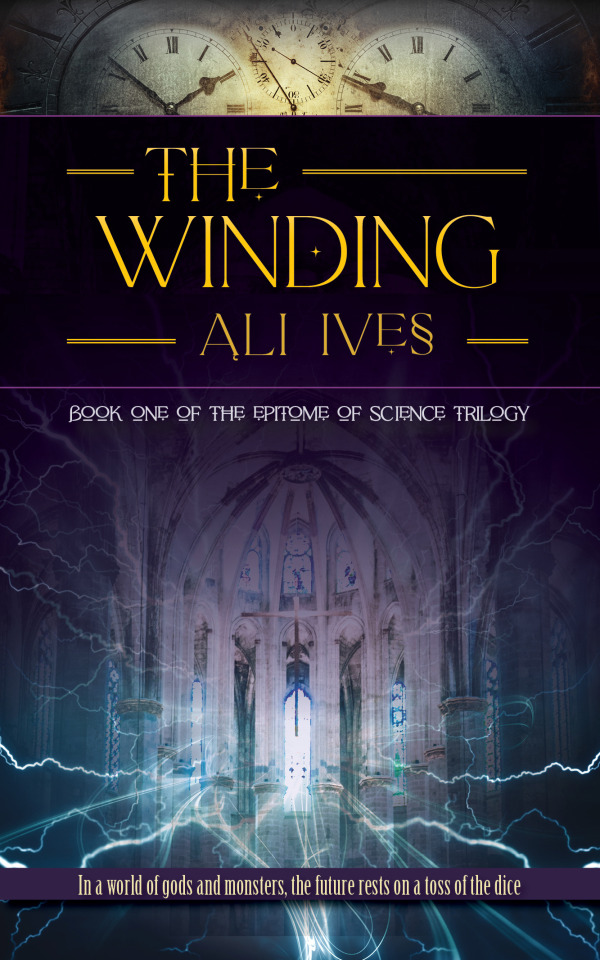
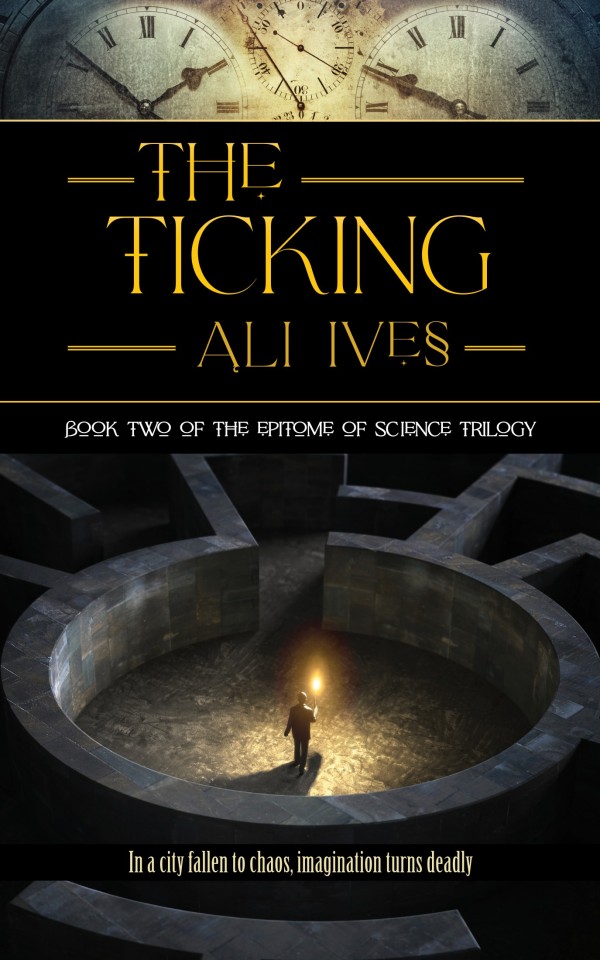
The Epitome of Science trilogy is an urban fantasy series set in an alternate world, where clockwork technology reigns supreme and magic lurks in unexpected places. Our main protagonist is Mikalai Gloucester, a former bodyguard arrested for a crime he doesn't remember committing. He's released in exchange for helping the very man who destroyed his life, and soon finds himself caught up in a whirlwind of magic, colourful characters, kidnapping and mysterious demigods. And that's just in The Winding!
I wanted to write the sort of books I really wanted to read, with loads of queer characters who have lives and storylines beyond coming out and romance, where their queerness is undeniable but also not always the focus of the plot, since that was a really rare thing when I was growing up (let's be real, books with ANY queerness in them were rare in the 90s).
Here are some things you'll find within The Winding and The Ticking:

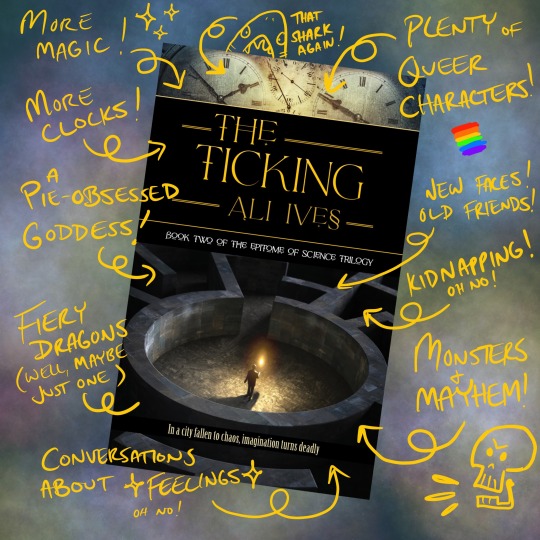
If they sound like something you'd be interested in, please check them out!
Where to find them:
They're published through an indie publishing house called Literary Wanderlust, and the ebook is available through their online bookshop. Since tumblr tends to bury posts with links to other sites, I'm not including any, in hopes that this might reach more people, but you can find their site with a quick internet search. The paperback copies are only available from LWL's site if you're in the US, but us non-Americans can order them through other sources, such as local indie bookshops!
Book 2, The Ticking, just came out in January and Book 3 is officially in the works!
#lgbtqia books#queer fantasy#urban fantasy#epitome of science#lgbt fiction#the ticking novel#the winding novel#the epitome of science#Literary Wanderlust
19 notes
·
View notes
Text
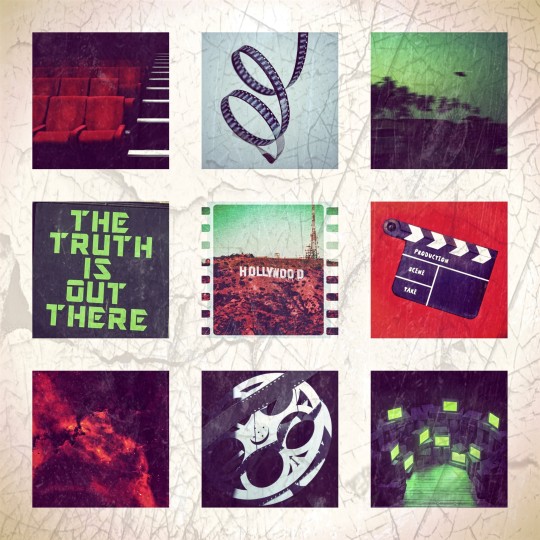
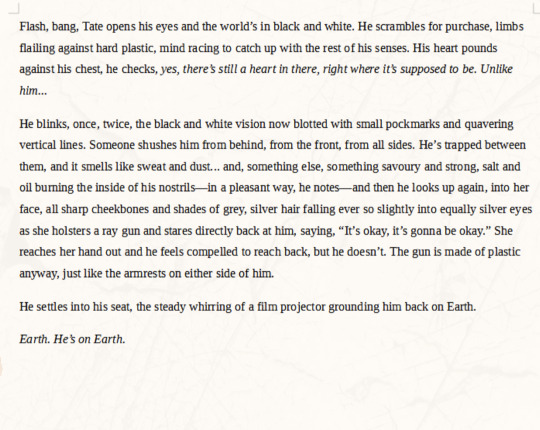
All The Stars in the Sky (and on Hollywood Boulevard)
An excerpt from a WIP I may or may not continue and may or may not ever formally introduce, but wanted to share.
#wip aesthetic#writing#writeblr#my writing#wip excerpt#wip graphics#wip moodboard#my graphics#science fiction#literary fiction#writblr#writing community#id in alt text#ask me about it and maybe I'll actually work on it 😔
12 notes
·
View notes